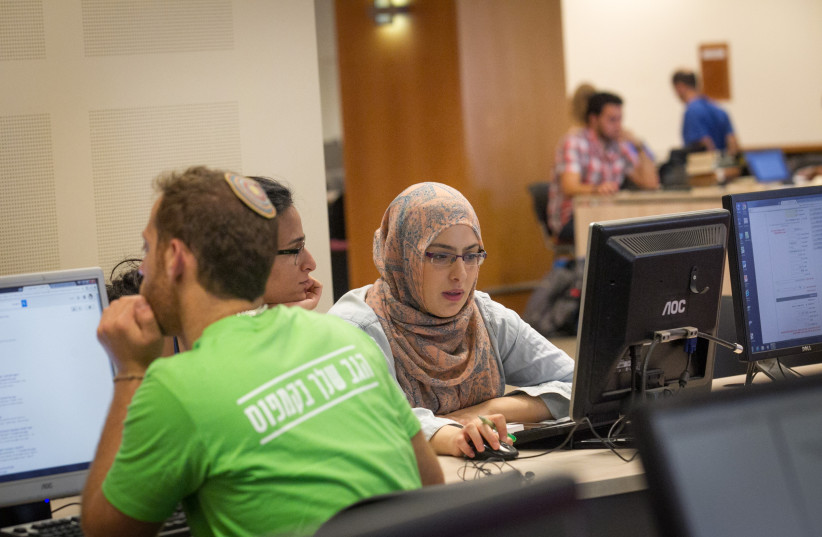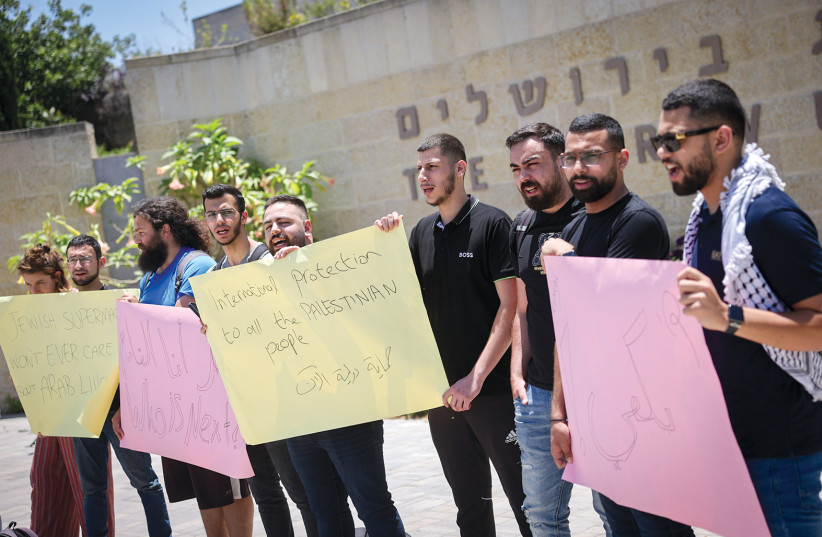With a new school year now underway in the United States, Israel, and worldwide, it is an ideal time to take a closer look at how education impacts society.
Research consistently shows that strengthening education systems is one of the most effective ways to reduce poverty. UNESCO has documented that the total number of people living in poverty could be more than halved worldwide if all adults completed secondary education.
Income and socioeconomic status, meanwhile, rise with levels of educational attainment. In the US, the National Center for Education Statistics shows that the median earnings of those with a bachelor’s degree are 55% higher than the earnings of those who only completed high school, and the median earnings of individuals with a master’s or higher degree are 21% higher than people whose education concluded with a bachelor’s degree. In Israel, wages for university graduates are about 10% higher than the wages of graduates from local public colleges, according to the Bank of Israel.
For education to effectively strengthen the nation as a whole, it must be accessible to the entire Israeli population – including its sizable 21% Arab minority. On this front, much progress is needed in Israeli society, where 36.6% of Jews but just 16.2% of Arabs possess a higher education degree (according to the country’s Central Bureau of Statistics).
The OECD found in 2019 that the gap between the abilities of Hebrew-speaking and Arabic-speaking students in Israeli schools is the largest of its kind between socioeconomic groups in 79 countries that have participated in the Programme for International Student Assessment (PISA) tests, with Hebrew speakers scoring 506 points in reading skills, compared with 362 points scored by native Arabic speakers. At the time, Blue and White party leader MK Benny Gantz said that these achievement gaps “require all of us to pause, change course, and define a nationwide program to ensure equal educational opportunity for all.”

Israel’s Arab school system allocated lower budgets at all levels
Indeed, Education Ministry data shows that Israel’s Arab school system is allocated lower budgets at all educational levels – anywhere from 20% to 40% lower than Jewish schools – while the schools have fewer staff training days; fewer funds for special programs and supervision; and a shortage of infrastructure such as computers, science labs, and libraries. It is therefore no surprise that despite comprising 20% of the Israeli population, Arabs are responsible for only 8% of its GDP.
These educational gaps have a ripple effect on socioeconomic status, data released this past June by Israel’s Central Bureau of Statistics reveals. Consider the following: 76.5 percent of Jewish households but only 53.7% of Arab households can cover their monthly expenses. The employment rate is 64.4% for Jewish men and 61.6% for Jewish women, but 50.4% for Arab men and 28.3% for Arab women. The average monthly net income is $4,919 for Jewish homes and $3,268 for Arab households.
Jewish women live an average of 85.1 years and Jewish men 81.3 years, compared to 81.2 years for Arab women and 76.3 years for Arab men; 70.4% of Jews and 51.1% of Arabs are satisfied with their economic situation. Among every 1,000 people in each demographic, 98.9 Jews and 156.6 Arabs are registered with social services.
Further, the Israel Democracy Institute has found that the poverty rate among Israeli Arabs (45%) is more than three times higher than among Jews (13%). Given the frustration that can result from a dire socioeconomic situation, it is telling that 170 Israeli Arabs had been murdered this year as of early September, already a significant increase from 111 in 2022 – a rise that Israeli officials attribute to organized crime within the Arab community.
Former Education Minister Yifat Shasha-Biton has emphasized that “strengthening the education system in Arab society and investing in it is the key to reducing the gaps in Israeli society, for optimal integration, and for maintaining our resilience as a state. The budgets that will be invested in the education system in the Arab localities will provide its students with tools and skills that will strengthen the community.”
Shasha-Biton’s alma mater, the University of Haifa, understands arguably better than any other Israeli academic institution that stronger social and workforce integration for the Arab community through the vehicle of higher education will translate into a stronger Israel. The university’s proportion of Arab undergraduate students (45%), including Druze and Bedouin students, more than doubles the Arab share of Israel’s total population.

ISRAELI ARABS enroll at the University of Haifa in part for practical reasons; more than half (51.6%) of Israeli Arabs live in the country’s North, and Haifa has the only research university in close proximity to their home villages in that region. Many Arab women are discouraged from leaving home for their studies, making the university the most convenient and accessible choice. However, they also enroll because the university makes them feel uniquely welcome and at home. Its philosophy of coexistence and shared society revolves around three pillars: facilitating honest dialogue, expanding access to higher education to empower the Arab population, and teaching tactics for peaceful coexistence to Arabs and Jews, so that they can become agents of social change.
The University of Haifa is keen on making a local and regional impact through the character of its student body. Eighty-four percent of undergraduates come from the northern Israeli periphery, positioning the school as an educational, economic, and social anchor in the region. Community service projects initiated by the Jewish-Arab Community Leadership Program, in turn, ensure that Jewish and Arab students are working together to give back to the community. The program unites Jews and Arabs in an environment in which they are equals, well-grounded in their identities, empowered and confident, and possessing the tools to create a genuine discourse and real transformation in society.
Many in the Arab sector have yet to reap the full array of benefits of the Start-up Nation. This is not the result of Arabs being incapable of strongly contributing to the country, but rather, the socioeconomic obstacles that hold back their advancement. This means that a significant segment of Israel’s potential workforce is largely untapped.
The Start-Up Nation Policy Institute (SNPI), in collaboration with the Israel Innovation Authority and Hasoub – a nongovernmental organization dedicated to promoting Arab tech entrepreneurs – issued a report revealing that since 2018 there has been very little growth in Arab employment in the Israeli tech sector. In fact, while the share of Arab employees in hi-tech reached 2.2% in 2018, it declined to 1.8% in 2021, and today only 0.8% of tech CEOs are Arab.
THE UNIVERSITY of Haifa offers a multitude of programs to strengthen academic and employment prospects for Arab students. This includes employing Arabic-speaking academic consultants to assist Arab students who are struggling with their assignments. The students work closely with the consultants, who provide them with learning and time management strategies and even offer to mediate between students and faculty members when necessary. The school also offers psychological counseling for emotional support, linguistic experts who give Arabs free didactic diagnoses to detect and offer assistance for learning disabilities, mentoring programs in local Arab high schools to show young pupils that higher education is a viable option, and free Arabic classes for its non-Arabic speaking professors to communicate better with Arab students.
These initiatives enrich the university’s campus and Israeli society. It is a winning formula because all students, no matter their background, are given a genuine chance to excel both during their time on campus and upon their entrance into the workforce.
The diverse landscape of American supporters of Israel, regardless of their particular opinion on any issue, largely share the goal of contributing in ways that will strengthen Israel and its people. And that is why they should be paying special attention to the education of the Israeli Arab population.
Arab participation in the workforce is a crucial piece of maintaining Israel’s economic strength, and consequently, the university is helping to create a stronger Israel by not only educating more Arab students than any other Israeli university but also implementing programs that facilitate their long-term personal and professional success.
With a continued and increased commitment to educating the Arab community and Israel’s entire population, the country’s socioeconomic future can be strengthened through the robust participation and contributions of all demographic sectors in the workforce.
The writer is CEO of the American Society of the University of Haifa.
